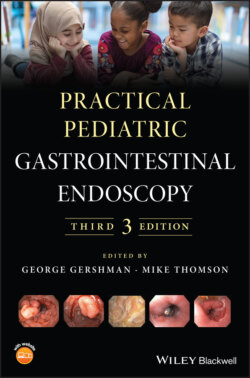Читать книгу Practical Pediatric Gastrointestinal Endoscopy - Группа авторов - Страница 56
Direct observational assessment tools
ОглавлениеIn recent years, accreditation bodies and endoscopy training and credentialing guidelines have all placed greater emphasis on the continuous assessment of trainees as they progress towards competence. To this end, direct observational assessment tools have emerged to support a competency‐based education model that defines desired training outcomes. It is critical to ensure that assessment tools are psychometrically sound and have strong validity evidence.
A number of endoscopy assessment tools have been developed in the adult contex [51] but they are not pediatric specific and validity evidence for use in assessing pediatric endoscopists remains limited. Walsh et al. [52] developed the Gastrointestinal Endoscopy Competency Assessment Tool for pediatric colonoscopy (GiECATKIDS), a task‐specific seven‐item global rating scale that assesses more holistic aspects of the skill and a structured 18‐item checklist that outlines key steps. Using Delphi methodology, the GiECATKIDS was developed by 41 pediatric endoscopy experts from 28 North American hospitals, and addresses performance of all components of a colonoscopy procedure, including pre‐, intra‐, and postprocedural aspects. In one study of 116 colonoscopies performed by 56 pediatric endoscopists (25 novice, 21 intermediate and 10 experienced) from three North American academic hospitals, the GiECATKIDS was found to be a reliable and valid measure that can be used in a formative manner throughout training [53]. The GiECATKIDS has also been found to have strong interrater reliability, excellent test–retest reliability, evidence of content, response process and internal structure validity, discriminative validity (ability to detect differences in skill level), validity evidence of associations with other variables thought to reflect endoscopic competence (e.g., ileal intubation rate), and educational usefulness [53].
Ultimately, the integration of rigorously developed assessment tools, such as the GiECATKIDS, will provide a means to document progress throughout the training cycle. In addition, these tools can be used to support trainees’ learning through the provision of instructive feedback, allow program directors to monitor skill acquisition to ensure trainees are progressing, facilitate identification of skill deficits, and help ensure readiness for independent practice [51,54]. Looking to the future, the universal adoption of robust assessment tools by pediatric gastroenterology training programs across jurisdictions would be useful, as it would generate aggregate data that could be used to develop average learning curves of pediatric endoscopists. These data could also be used to define milestones for pediatric endoscopists at different levels of training and help to establish minimal performance‐based benchmark criteria for competence in pediatric endoscopy procedures to support competency‐based training.
